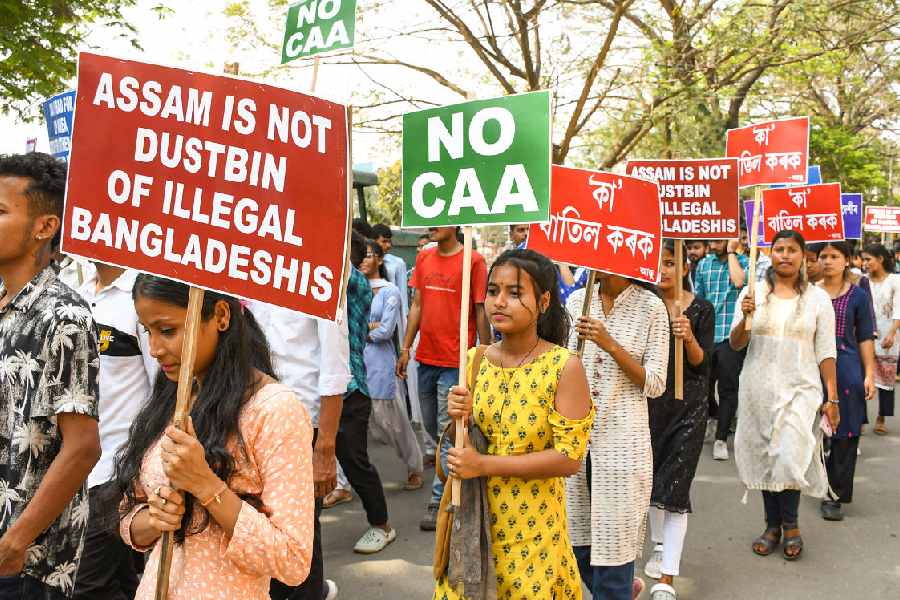The All Assam Students Union (AASU), which spearheaded a six-year-long agitation against illegal immigrants in Assam in 1979-85, welcomed the Supreme Court judgment upholding the validity of Section 6A of Citizenship Act.
AASU described the judgment as "historic" while the original petitioner who challenged the provision of the law termed the ruling as "unfortunate" saying it will make the state a "dumping ground" for foreigners.
AASU chief adviser Samujjal Bhattacharjya said with its order on Section 6A of Citizenship Act 1955, the Supreme Court has given its stamp of approval to the Assam Accord under which all those who had entered Assam illegally must be detected and deported from the country.
Section 6A was inserted into the Citizenship Act as a special provision to deal with the citizenship of people covered under the 1985 Assam Accord signed by the Rajiv Gandhi government with the AASU, then headed by Prafulla Kumar Mahanta, who later twice became chief minister of Assam.
"We wholeheartedly welcome the Supreme Court verdict. It is a historic verdict. It has established that the Assam agitation was undertaken with genuine reasons and all provisions of the Assam Accord are now legally validated by the apex court," Bhattacharjya told PTI.
He said it is now the responsibility of the central and the Assam governments to implement the remaining provisions of the four-decade-old Assam Accord with all sincerity.
However, Matiur Rahman, a former AASU leader who filed the original petition in the Supreme Court on behalf of the Sanmilita Mahasabha, an Assam-based organisation challenging the inclusion of Section 6A in the Citizenship Act, said he was not expecting such a verdict. They wanted 1951, and not 1971 which is the year fixed in the Assam Accord, as the cut-off year for the detection and deportation of all illegal immigrants in Assam.
"We wanted the rights of the indigenous people of the Assam to be fully protected and hence, we have been seeking 1951 as the cut off date for deportation of all illegal immigrants from Assam.
"The Supreme Court verdict will jeopardise the rights of Assam's indigenous people. You can't make Assam a dumping ground for illegal immigrants. The judgment is very very unfortunate," he told PTI over phone.
Rahman said his organisation will carefully examine the judgment and see whether it can be challenged in a bigger constitutional bench.
According to the Assam Accord, all persons who came to Assam prior to January 1, 1966, including those whose name appeared on the electoral rolls used in the 1967 elections, shall be regularised.
It said foreigners who came to Assam after January 1, 1966 (inclusive) and upto March 24, 1971 shall be detected in accordance with the provisions of the Foreigners Act, 1946 and the Foreigners (Tribunals) Order 1964.
The names of foreigners so detected will be deleted from the electoral rolls in force. Such persons will be required to register themselves before the registration officers of the respective districts in accordance with the provisions of the Registration of Foreigners Act, 1939 and the Registration of Foreigners Rules, 1939, the accord said.
On the expiry of 10 years following the date of detection, the names of all such persons which have been deleted from the electoral rolls shall be restored, it said. All persons who were expelled earlier but have since re-entered illegally into Assam shall be expelled.
Foreigners who came to Assam on or after March 25, 1971 shall continue to be detected, deleted and expelled in accordance with law. Immediate and practical steps shall be taken to expel such foreigners.
Most of these provisions were part of the Section 6A of Citizenship Act 1955 which were incorporated as "Special provisions as to citizenship of persons covered by the Assam Accord".
Except for the headline, this story has not been edited by The Telegraph Online staff and has been published from a syndicated feed.











